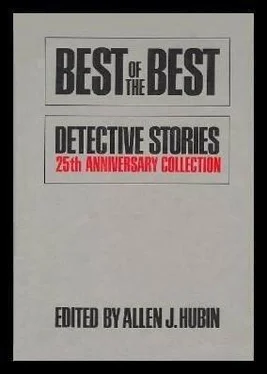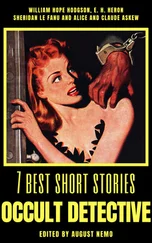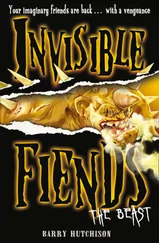Stephen Barr - Best of the best detective stories - 25th anniversary collection
Здесь есть возможность читать онлайн «Stephen Barr - Best of the best detective stories - 25th anniversary collection» весь текст электронной книги совершенно бесплатно (целиком полную версию без сокращений). В некоторых случаях можно слушать аудио, скачать через торрент в формате fb2 и присутствует краткое содержание. Город: New York, Год выпуска: 1971, ISBN: 1971, Издательство: E.P. Dutton & Co., Жанр: Детектив, на английском языке. Описание произведения, (предисловие) а так же отзывы посетителей доступны на портале библиотеки ЛибКат.
- Название:Best of the best detective stories: 25th anniversary collection
- Автор:
- Издательство:E.P. Dutton & Co.
- Жанр:
- Год:1971
- Город:New York
- ISBN:978-0-525-06450-3
- Рейтинг книги:5 / 5. Голосов: 1
-
Избранное:Добавить в избранное
- Отзывы:
-
Ваша оценка:
- 100
- 1
- 2
- 3
- 4
- 5
Best of the best detective stories: 25th anniversary collection: краткое содержание, описание и аннотация
Предлагаем к чтению аннотацию, описание, краткое содержание или предисловие (зависит от того, что написал сам автор книги «Best of the best detective stories: 25th anniversary collection»). Если вы не нашли необходимую информацию о книге — напишите в комментариях, мы постараемся отыскать её.
Best of the best detective stories: 25th anniversary collection — читать онлайн бесплатно полную книгу (весь текст) целиком
Ниже представлен текст книги, разбитый по страницам. Система сохранения места последней прочитанной страницы, позволяет с удобством читать онлайн бесплатно книгу «Best of the best detective stories: 25th anniversary collection», без необходимости каждый раз заново искать на чём Вы остановились. Поставьте закладку, и сможете в любой момент перейти на страницу, на которой закончили чтение.
Интервал:
Закладка:
“It doesn’t matter what time I turn up at my father-in-law’s place. I can have dinner on my way down.” He added: “Be generous, and let’s use my car.”
Crouch could put an infernal persuasiveness into his voice. Again and again in the past Stretton had let himself against his will be talked into agreement.
“Very well! But we may find that I haven’t got the passport.” He looked at the mastiff with misgiving. “D’you want to park the dog with the vet first?”
“No. Two sides of a triangle. Quicker to drop him after I leave you.”
He opened the rear door of the car. The mastiff ambled in and bestowed himself on the floor.
“Make for the other side of dockland — near Tillbury — and then I’ll pilot you,” said Stretton as he got in beside Crouch. “I’m right in the wilds on the north bank of the river.”
Crouch skirted North London, driving eastwards. Now and again they exchanged commonplace remarks — thrown, as it were, over the wall of hatred between them.
In a long traffic block, Crouch leaned over and patted the mastiff. The dog yawned. Crouch glanced from the huge jaws to Stretton’s throat. For it was Crouch, the victim, who had the psychology of a murderer — the kind of murderer who kills slowly; and without tangible weapons.
As students they had been normal young men of more than average promise, normal in their friendship, with a touch of honest, unconcealed jealousy on Crouch’s part.
In the 1914 war they were in the same Technical Company. On their way out the troopship had been torpedoed, when Crouch’s nerve had failed rather lamentably, and Stretton, at some risk of his own life, had saved him from drowning.
It may be doubted whether any man can feel unalloyed gratitude to another for saving his life. He is apt to regard his rescuer as a moral creditor who can never be paid off. In the special circumstances — notably the circumstance of Crouch’s panic — Stretton had incidentally committed the offense of revealing a definite superiority.
Thereafter their relationship had changed, but so subtly that Stretton had been unaware of it. Crouch persuaded himself that he detected patronage in the other’s manner. He hid his resentment, used it as fuel to the inner fire which burned steadily for the rest of his life.
For ten years following return to civil life, Stretton did not know that Crouch had become his enemy: once or twice he had his suspicions, but Crouch talked his way out. It was not until Crouch actually married Leonie that the truth flashed upon Stretton. Even then he did not understand why. Stretton had, almost literally, forgotten the life-saving episode.
The first outstanding incident occurred when Stretton was given a favorable opportunity to acquire a junior partnership. While he was completing arrangements with his bank manager, he was informed that the opportunity had been snapped up by another — who turned out to be Crouch. But Crouch had explained that away.
Later, Stretton leased patent rights in an invention of his own — a valuable adaptation of the steam turbine — to Harmoddle, Limited, who intended to put the engine into immediate production. A few weeks later Crouch became Chairman of Harmoddle’s. The patent rights were retained: the penalties for nonproduction were paid quarterly. But Stretton’s engine was kept off the market. Crouch explained that away, too.
In the course of professional visits to Brussels, Stretton met and eventually proposed marriage to Leonie. Owing to the strict religious views of her family they had decided to marry without religious ceremony in England. During some slight routine delay which he encountered in connection with her passport she wrote breaking off the engagement and begging him not to see her again.
Stretton did not grieve very much at the time. Her harsh and arbitrary rejection of him even inclined him to the view that he had had a lucky escape, notwithstanding her very considerable physical attractiveness.
Six months later Crouch, having converted himself to the religious views of her family, married her ceremonially in Belgium.
Instantly, the frustrations of the last ten years were floodlit. Stretton derided himself as a credulous fool who had let Crouch on his shoulders to steal or to spoil the prizes.
There was no showdown, no harsh words, nothing in the nature of a quarrel. It was as if their friendship had merely lapsed. Stretton settled down to the kind of passive, well-mannered hatred that rarely harms its object but acts as slow poison in the brain of the hater.
He stood well in his profession, but his career had its ups and downs: when the slow poison got to work he debited all the downs to Crouch. Leonie became the symbol of his blighted life. The memory of her physical beauty began to torture his imagination, shutting out the possibility of his seeking other women. In the background of this obsession was some kind of belief that she would one day come to him. When he learned of her death he had a nervous breakdown.
After some weeks in a nursing home he was advised to knock off work for a year and live a simple and muscular life in the open air. He bought the cottage in Essex, standing by itself on the fringe of the marsh, where he dug and re-dug the garden, occasionally shooting duck and occasionally sailing in the Thames estuary.
Within a year of Leonie’s death he learned from the personal column of an engineering journal that Crouch had married again. The same column misinformed him that Crouch had joined his wife for a short vacation at her father’s house in Sussex.
His physical health had been greatly improved, but the vision of Leonie persisted, finally driving him to look at the outside of the house in which another had enjoyed her charms.
Sunk in his own thoughts, Stretton forgot to function as pilot when they reached and passed Tillbury. Within half a mile of the cottage it dawned on him that Crouch had taken the correct route off the main road, through the lanes.
He had not given Crouch the name of the cottage. Even with that information a stranger would have to inquire, or to put in some close work with an ordnance map.
They were now in a very lonely spot. Linked with the realization of Crouch’s odd behavior was acute consciousness of the mastiff lying on the floor behind, separated only by the back of the bucket seat. Stretton felt a prickling in his spine. He would have concealed his feeling, but for a mischance of the road.
The whole incident was over in a few seconds. A shaggy, white-coated sheepdog burst through the hedge almost under the wheels of the car. Crouch braked hard. The mastiff sprang up with a whine. A sound like a muffled scream broke from Stretton.
“Sorry!” exclaimed Crouch. “Couldn’t help it.” From the other’s tone Stretton felt sure he had betrayed himself.
Ahead, the lane dipped into a stream some ten feet wide.
“Can I get through, Dennis?”
He knew he could get through, thought Stretton, because he had been here before. But he answered:
“You’ll be all right if you take it very slowly. It’s only a cattle-ford.”
To himself his voice had sounded wobbly. The mastiff was sitting on its haunches, looking through the windscreen, its head between those of the two men. Stretton was nauseated by the creature’s breath. He was still unsure of his voice, felt he must put it to the test.
“Don’t let your megatherium jump out of the window and eat that sheepdog,” he said, as Crouch slowed to walking pace for the ford, “or the farmers will smoke me out.”
“Oscar would never fight until I told him to,” laughed Crouch. “And then he’d fight anything.”
The laugh rasped Stretton’s nerve. No unarmed man would stand a chance against that animal. And Crouch was putting on an act, of some sort.
Читать дальшеИнтервал:
Закладка:
Похожие книги на «Best of the best detective stories: 25th anniversary collection»
Представляем Вашему вниманию похожие книги на «Best of the best detective stories: 25th anniversary collection» списком для выбора. Мы отобрали схожую по названию и смыслу литературу в надежде предоставить читателям больше вариантов отыскать новые, интересные, ещё непрочитанные произведения.
Обсуждение, отзывы о книге «Best of the best detective stories: 25th anniversary collection» и просто собственные мнения читателей. Оставьте ваши комментарии, напишите, что Вы думаете о произведении, его смысле или главных героях. Укажите что конкретно понравилось, а что нет, и почему Вы так считаете.












